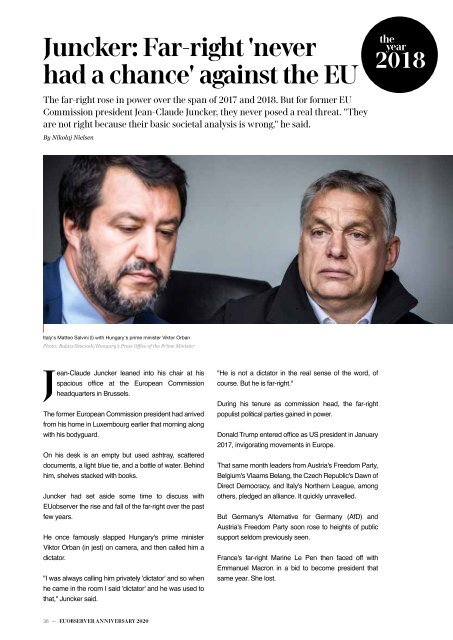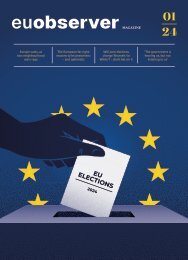20 years of European journalism & history
Twenty years doesn't seem a lot. Certainly not in the light of European history. But while we were writing this magazine for the 20th anniversary of EUobserver, we were surprised just how much happened in the European Union in those two decades.
Twenty years doesn't seem a lot. Certainly not in the light of European history.
But while we were writing this magazine for the 20th anniversary of EUobserver, we were surprised just how much happened in the European Union in those two decades.
Create successful ePaper yourself
Turn your PDF publications into a flip-book with our unique Google optimized e-Paper software.
the<br />
Juncker: Far-right 'never<br />
had a chance' against the EU <strong>20</strong>18<br />
year<br />
The far-right rose in power over the span <strong>of</strong> <strong>20</strong>17 and <strong>20</strong>18. But for former EU<br />
Commission president Jean-Claude Juncker, they never posed a real threat. "They<br />
are not right because their basic societal analysis is wrong," he said.<br />
By Nikolaj Nielsen<br />
Italy's Matteo Salvini (l) with Hungary's prime minister Viktor Orban<br />
Photo: Balazs Szecsodi/Hungary's Press Office <strong>of</strong> the Prime Minister<br />
Jean-Claude Juncker leaned into his chair at his<br />
spacious <strong>of</strong>fice at the <strong>European</strong> Commission<br />
headquarters in Brussels.<br />
The former <strong>European</strong> Commission president had arrived<br />
from his home in Luxembourg earlier that morning along<br />
with his bodyguard.<br />
On his desk is an empty but used ashtray, scattered<br />
documents, a light blue tie, and a bottle <strong>of</strong> water. Behind<br />
him, shelves stacked with books.<br />
Juncker had set aside some time to discuss with<br />
EUobserver the rise and fall <strong>of</strong> the far-right over the past<br />
few <strong>years</strong>.<br />
He once famously slapped Hungary's prime minister<br />
Viktor Orban (in jest) on camera, and then called him a<br />
dictator.<br />
"I was always calling him privately 'dictator' and so when<br />
he came in the room I said 'dictator' and he was used to<br />
that," Juncker said.<br />
"He is not a dictator in the real sense <strong>of</strong> the word, <strong>of</strong><br />
course. But he is far-right."<br />
During his tenure as commission head, the far-right<br />
populist political parties gained in power.<br />
Donald Trump entered <strong>of</strong>fice as US president in January<br />
<strong>20</strong>17, invigorating movements in Europe.<br />
That same month leaders from Austria's Freedom Party,<br />
Belgium's Vlaams Belang, the Czech Republic's Dawn <strong>of</strong><br />
Direct Democracy, and Italy's Northern League, among<br />
others, pledged an alliance. It quickly unravelled.<br />
But Germany's Alternative for Germany (AfD) and<br />
Austria's Freedom Party soon rose to heights <strong>of</strong> public<br />
support seldom previously seen.<br />
France's far-right Marine Le Pen then faced <strong>of</strong>f with<br />
Emmanuel Macron in a bid to become president that<br />
same year. She lost.<br />
36 — EUOBSERVER ANNIVERSARY <strong>20</strong><strong>20</strong>

















